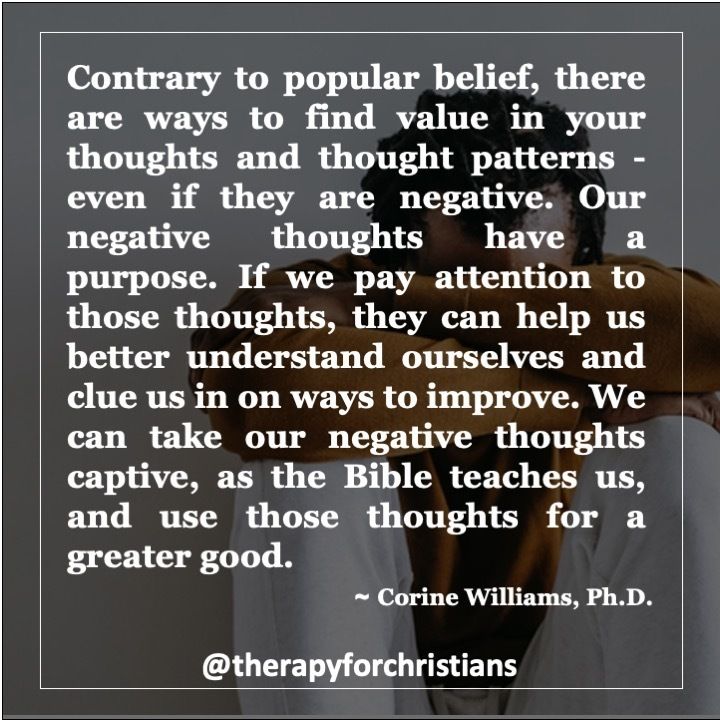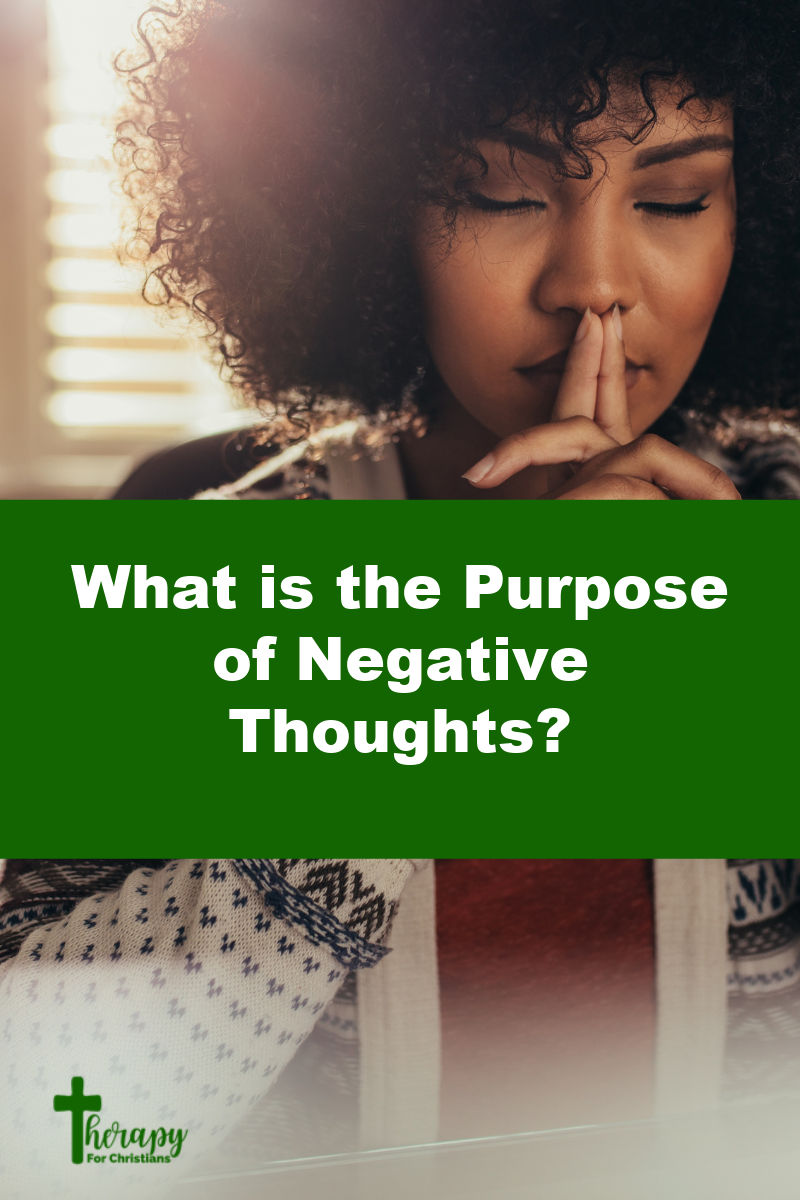
 Contrary to popular belief, there are ways to find value in your
Contrary to popular belief, there are ways to find value in your Like this content on Facebook thoughts and thought patterns - even if they are negative. The truth of the matter is, we all are prone to fall into negative or unhelpful thinking patterns. However, our negative thoughts have a purpose. If we pay attention to those thoughts, they can help us better understand ourselves and clue us in on ways to improve. We can take our negative thoughts captive, as the Bible teaches us, and use those thoughts for a greater good.
Like this content on Facebook thoughts and thought patterns - even if they are negative. The truth of the matter is, we all are prone to fall into negative or unhelpful thinking patterns. However, our negative thoughts have a purpose. If we pay attention to those thoughts, they can help us better understand ourselves and clue us in on ways to improve. We can take our negative thoughts captive, as the Bible teaches us, and use those thoughts for a greater good.
Understanding Negative or Unhelpful Thinking (NUTs)
I’ve coined the term NUTs (negative or unhelpful thinking) to help Christians pay attention to their negative thinking patterns and help transform thoughts into those we should have as followers of Christ.
Without going into too much detail, I do find it necessary to break down a few negative or unhelpful thinking patterns that you may already be familiar with in your own life. While reading this section forward, do not look for a diagnosis within yourself. I want you to simply become familiar with common thought processes that we all face at some point in time. This will also help pave the way in finding value in your thoughts.
Whether by conditioning or trauma-induced, our thought patterns speak a lot about your current state of mind and hold the key to our actions. For example, blaming (self or others) is a common NUT that says, “I’m taking the blame for something I wasn’t totally responsible for” or the opposite (ignoring your role in the situation).
Another common NUT is using "should statements". You may have heard the saying, “Stop should-ing on yourself.” But the reality is, it happens more commonly than not. “I should go to the gym. I should have done a better job. I should-...” You get the point? Should (shouldn’t, ought, etc.) easily become the foundation to excuses and the lack of seeing yourself as the amazing creation of God that you are.
So what does this have to do with finding value in your negative thinking? By the way, you can read more about common negative thinking in this article: Combating Negative Thinking As a Christian.
How to Find Value in Your Negative Thoughts
First and foremost, every thought - both good and bad - tells us more and more about ourselves. Which is why I want you to resist the worldly concept of just replacing you negative thinking with positive thinking. When negative thoughts arise, it is critical to examine each one for any God-honoring lessons it may contain. Satan uses superficial messages from your negative thoughts and negative emotions to keep you occupied distracted. God, on the other hand, wants you to go deeper into your thoughts and emotions to learn more about yourself and your ideals. This is why the Bible instructs us to keep our minds in check (2 Corinthians 10:4).
This is where the value comes into play. Seeing value in anything will cause you to appreciate it more, work on what needs to be worked on, and change anything needing to be changed. This is true both in negative thoughts, negative feelings, and negative actions. Here’s how to find value in your thoughts.
See Your Negative Thoughts as a Way to Understand Yourself Better.
Whether we want to focus on this area or not, we as human beings are always evolving. Not in a New Age kind of way, but in a way similar to the seasons. As a middle-aged woman, you are most likely not involved in the same things as you were in your teens and early 20s. As you age, your seasons typically change. Once you become a parent, the seasons of parenting change as your children get older. And so on… So when you decide to pay attention to your thought processes and negative thinking patterns, they become a gauge for understanding yourself better along this journey of life. Pin ItYour Negative Thoughts Hold Valuable Messages.
Pin ItYour Negative Thoughts Hold Valuable Messages.
At first it can be difficult to see beyond the negativity of a thought. For example, one negative thought that comes to mind is, “I’m a bad wife.” The values this thought holds are humility and accountability. So the message here is you have a particular standard set for how you want to be as a wife. And what typically has happened is you have not received the appreciation or positive feedback from your husband that endorses your expectation.
The thought, "I'm a bad wife" shows that you value being a good wife to your husband, which is not a bad thing. What may need to be adjusted is the expectations you have placed on yourself to uphold your own standard.
Pay Attention to What the Thought is Showing You.
Continuing from the example mentioned in the last suggestion, thoughts hold messages but also the roadmap for making any necessary changes. Of course, this isn’t common knowledge, which is why I suggest connecting with a licensed and trained mental health therapist who can walk you through learning these tools. Then, you’ll be able to take what you have learned and rinse and repeat without guidance.
Until then, let’s use the thought "I'm a bad mom" to illustrate what I mean. You can use want one your thoughts apply the below eight steps.
Step 1: Identify what is stressing you or causing you to feel strong emotions.
I decided to return to work next week. I really love my son, but I also love the work I do.
Step 2: Identify the feelings you have associated with the stressor.
Sadness; guilt, anger, and hopeless.
Step 3: What are you noticing in your body? (i.e., do you notice any pressure, tension, discomfort, and stiffness in your body? Is your breathing deep, shallow, quick, or slow?)
My whole by just felt numb. Like I did not want to breath, move or do anything. It was like I was just frozen looking at my son.
Step 4: Did you experience this feeling or these feelings as a child? If yes, write about what happened (i.e., how old were you, what happened?). What did you need in that moment?
I'm not sure, I think I may have felt this way when my family moved to another state when I was in 9th grade. I remember trying to convince my parents why we couldn’t move. I had just made the cheer team. I had my first best friend and my first crush. I really just wanted my parents to listen to me. . . may be help me figure out how to stay connected to my best friend. Back then there were no cell phones and things.
Step 5: What are your current thoughts concerning the stressor identified in step 1:
I’m a bad mom for going back to work.
Being a mom should be enough.
Step 6: What types of NUTs are you engaging in?
I am likely to be engaging in all the NUTs. For example, when I say I am a bad mom for returning to work, I am dividing all moms into “good moms” and “bad mom.” The truth is that all moms have areas they do good and areas where they struggle. I am clearly labeling myself as a "bad mom." I am jumping to conclusion because I think if going to work makes me a bad mom. I have not even started yet. I'm also overgeneralizing, when I conclude I am a bad mom because being a mom involves more than whether or not I work. Similarly, I am engaging in mental filtering by filtering out all the ways I am a "good mom"(i.e., I already have a strong bond with my son).
Step 7: What are some positive aspects, advantages, or benefits of these thoughts or feelings? What do these thoughts or feelings show about me and my values that are beautiful, positive, and awesome?
"I'm a bad mom" - shows I have high standards as a mom. It also shows I love my son.
Guilt – is there to remind me to ask myself the hard questions to figure what it look like to be a mother for my son. I want to model to him the importance of working hard.
Anger – shows that I value being treated fairly. My husband never questions whether working makes him a bad dad. Yet, because I am a woman, I question if I am a bad mom because I want to work.
Hopeless – reminds me that there is no right answer in this situation. People label working moms as bad moms all the time. Stay at home mom also have negative connotation as well.
Being a mom should be enough- I have always valued doing multiple things. That is the way God created me. There are really “no shoulds” in life.
Sadness – I love my son and will miss him while I am at work. He is already growing so fast.
Step 8: How can I tune into the above and tune out the NUTs? What should I do next because of the positive aspects of these thoughts and feelings? What are some positive aspects, advantages, or benefits of these thoughts or feelings? What does this thought or feeling show about me and my values that is beautiful, positive, and awesome?
1. Use the fact that I sometime think I am a bad mom as a reminder that I am not a bad mom. Bad moms don’t really think they are bad moms. Instead, I should use this thought to make sure I am meeting my standard of the mom I want to be (i.e., a mom that working on the calling God gave her with this job, a mom who wants to model the importance of hard work, a mom who will be there for all the big moments and most of the small moments).
2. In response to my sadness when I am home I need to be fully present. That means making sure I have appropriate boundaries with work not interfering with my home life.
3. I need to accept my anger and make sure I am not taking it out on my husband. I can raise my son to recognize that all women can be good moms (i.e., working, stay at home and everything in-between. The decision about whether a woman should work is only between that woman, God, and her husband/family).
The answers to the above eight questions can begin to unlock positive aspects, advantages, and benefits to what you have been feeling and thinking. This is where you can begin to identify beautiful and awesome values and good things about yourself!
An example would be: If you feel inadequate, that could show that you value effort and giving something your all. Instead of beating yourself up, look at it from the perspective of still needing to work on and improve yourself (which should be an ongoing thing).
Final Thoughts
I know we uncovered quite a bit in this post, but it is absolutely necessary to know that you are not alone in this walk. We all have a battlefield in our mind and the enemy wants nothing more than to get us thinking less than ourselves and even further from believing God’s Truths. The truth is you can conquer and overcome allowing NUTs to have control over your mind, words, and actions. You can find value in your negative thinking and use them in a way to grow in life and in your relationship with God.
It Is Well: A Christian Guided Journal
You take a deep dive into learning to find values in your thoughts and feelings by ordering my guided Christian mental health journal, It Is Well. It is Well contains 70 guided journaling activities which is enough for 10 weeks. These activities are designed to help you become more aware of the messages your thoughts and feeling are sending you and connect with God in the moment. In addition, it contains 40 strategies to help you learn to say, “It is well.”
About the Author:

Corine Williams, Ph.D. is Clinical Psychologist that is currently seeing clients in the States of Maryland, New Jersey, and New York. You can find out more about her practice by visiting www.therapyforchristians.com/corinewilliams. In addition to providing individual therapy, Dr. Williams is also passionate about writing books and designing merchandise that educate, uplift, and normalize mental health subject in the Christian community. You can find out more about her at www.booksbycorine.com or by visiting her amazon profile here: https://www.amazon.com/Corine -Hyman/e/B00AWZ5FL2
Help us increase mental health awareness in the Christian community by donating through our paypal link here: www.paypal.com/therapyforchristians, joining our mailing list by clicking below, or join our provider list here: Provider listing
Disclaimer: the information, including but not limited to, text, graphics, images and other material contained on this article are for informational purposes only. No material on this site is intended to be a substitute for professional medical advice, diagnosis or treatment. If you are looking for a Christian counselor near you, please check out our directory located here: Christians Therapist Near Me
.png)









